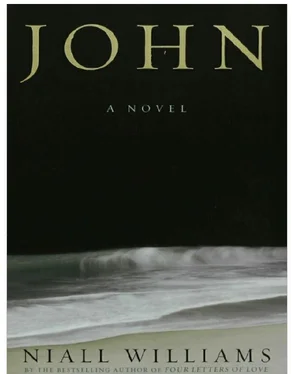Patience was short.
'My water, Sir. I cannot stay here all day. I have work.'
'My water, Sir, to wine, please. It is no trouble to you.'
You answered them not, and some grew angry and muttered against you. But left the water jars in case.
They went away, all but a few. It was in the seventh hour when the nobleman came.
'My son is on the point of death, Sir.'
Peter looked to you. There stirred among us a silent anticipation. We had sat a long time by the steps attending such a moment, flies and insects moving in the shade.
'Except ye see signs and wonders, ye will not believe,' you said.
The nobleman fell to his knees. 'Sir, come down to my son ere he die.'
His old face. His love for his son.
None of us spoke, the old man kneeling so.
I watched your eyes. The pity that pooled, this love of the father.
'Go thy way; thy son lives,' you said.
And he raised his face to you, and we could see that he believed. And did not need the proof of his servants coming on the road to meet him when he went back from Cana, and they told him on the seventh hour the fever had left his son.
I believed. I believed already all things were possible to you.
I leaned and touched your robe.
Simon sits with Ioseph. They sip a brown broth offish and pulses. Simon's face is pale, his eyes running with rheum. He is nearly the age of Ioseph but of a more anxious disposition. He troubles over his health, always certain that he is ill. His pains and aches are legion; he fears clouds and rain and wind, and must temper this against his faith that God watches over them. The death of his friend Prochorus, the sight of the disease blotching his face, has filled him with dread.
'You saw it,' he says to Ioseph.
'I did.'
'He was as a leper.'
'Yes.'
Simon scratches the back of his hands. Itches are intolerable. Heat of blood, he believes, a sign of his ill health. 'But there was no warning.'
'I saw him myself the morning.'
'So it just came. It just came like that, and he was dead.'
'The Lord took him. I am saddened for you, Simon. I know Prochorus was a close companion.'
'Why? Why would the Lord not take him peacefully in his sleep? Why would he not pause his breathing and leave him on his bed mat? I have these itches in my hands since. My breath is shallow; do you think my breath shallow, Ioseph?'
'No, Simon. You are as you always are.'
'What if it is beginning? What if the itches are. .'
'Simon.' Ioseph lays his hand across his friend's. For him he feels a duty of care, a bond he cannot quite explain; but it as though he is a kind of ointment, or knows the calm of his spirit to be the salve the younger man needs. 'Simon, do not be afraid.'
'I know. I know I should not even think such things. I know I should welcome what the Lord has in store for me. But I want to live to see. I want to live to see the promised day.'
'You will,' Ioseph says. 'God willing.'
Simon scowls at the broth; in the taste is something peculiar. It takes his mind from the itching.
'Matthias went out on a boat,' Ioseph says.
'Yes. I did not go. He did not ask me. But if he did, I would not go. The sea is treacherous this time of year. A storm can come from nowhere.'
'It is late for their returning. Did they return?'
'I did not see. I do not care greatly for our brother Matthias. Do you think something in this broth sour?'
'Only the reflection of your scowl, old friend.'
Simon sips it through tight lips, as if to sieve the sourness. Into the afternoon sky sail dark clouds. There is a wordless gap, the two old men sitting on their various discomforts, then Simon asks: 'Ioseph, do you think we will see Judea again?'
'Judea?'
'Yes. Do you think we will ever walk there freely again? I do not. Only in dreams now will I visit the house of my parents.'
Ioseph does not offer consolation.
'I have this thought, Ioseph; I will confess it to you that you may chastise me and forgive me for it. It is this: what if the Apostle dies?' Simon turns his rheumy eyes toward his old friend. 'I am a fool, and the weakest among us. But I confess I am afraid. What if he dies? What if you go to the cave in the morning and discovered? And the Lord has not come?'
'We believe he will come.'
'But if he doesn't? If this plague takes the Apostle? What will become of us?'
'He has survived many plagues, been imprisoned and stoned, had burning oil poured upon him. Yet he remains. He will not die, Simon. I believe he will not die until the Lord returns.'
Simon scratches at the back of his hands. 'I had a dream. In the dream there was a great storm, and sand blew and a city was lost beneath it. A whole city. No trace of it remained. Not a trace, Ioseph. It was forgotten.' His breath is shallow, his heart is jumping unevenly. 'If he dies, I have thought. If he dies, Jesus dies again. For we will fade away here without our witness, our testament. We will be a city forgotten beneath the sand. And this thought, once come to my mind, will not leave now.'
The light is swiftly fading out of the sky, and before them the sea deepens gray to black and churns like a mind troubled.
'If he dies,' Simon says again. But the words are neither question nor answer, and hang in the darkening. He looks down at the backs of his hands, sees the scratches from which thin blood seeps.
Auster presses his eye to the wood chink. Papias howls again and again, hand-patches the black blood and ooze, holds the jagged stump of ear root, touches the unstoppered hole in himself, views aghast the bloodied fingers, and falls unconscious to the ground.
Before him on the floor is the woman Marina, the knife stilled in her chest. Auster waits. He cannot move. He has not believed what has appeared before him. He saw no devil but heard the woman say the devil was there. He believes the devil is as great as God and has looked about him in the sky for signs of rupture, portents of presence. He has heard her say she killed her children. When she took the knife, he thought she would plunge it in the chest of the youth, and he had been transfixed and would not have been able to save him. In the instants after, Auster does not move. He fears evil invisible in the dwelling, thinks to run away, but is held by the terrible conceit that he may see here, now, the face of Lucifer. He presses against the wood wall, eyes downward for a serpent, upward for the fallen angel that might manifest fierce and dark and awesome in the roof space. He bites his lips to blood. He clings to the little dwelling, expectant of a revelation from which he cannot move. In his mind the fiery figure of the fallen, the proud, unvanquished though banished, possesses strange glory. He barely admits it to himself. But here by the fisher's hut it is this that delays him. The life leaks out of the youth. Still there comes no manifestation, no great wing-beat, no descent of fire. The sky is darkening, it is true. Perhaps if he waits longer. Perhaps this is the work of a minion, a lesser devil, and Lucifer himself must come from vast distance, ascend from nether regions, traverse fiery ringed chambers of the damned to arrive with warm flutter and seize the souls for himself? Auster studies the clouds, looks back inside the dwelling, where all is stilled now.
Where is he? Where is the devil?
From the boat, Matthias sees the smoke rise. His words done, they are sailing back to shore. It is a fisher's hut, he realises. It is burning to the ground. The black smoke curls and hangs in heavy pall above that end of the island. Matthias makes no comment. He has asked the disciples to pray with him that all may be enlightened, and their heads are bowed. With grim concern the pilot has indicated to Matthias the darkening of the sky and stirring sea and been given permission to sail them back. The waters slap at the sides, tilt and sway the slim boat with the bowed men, heads like darkened moons.
Читать дальше










